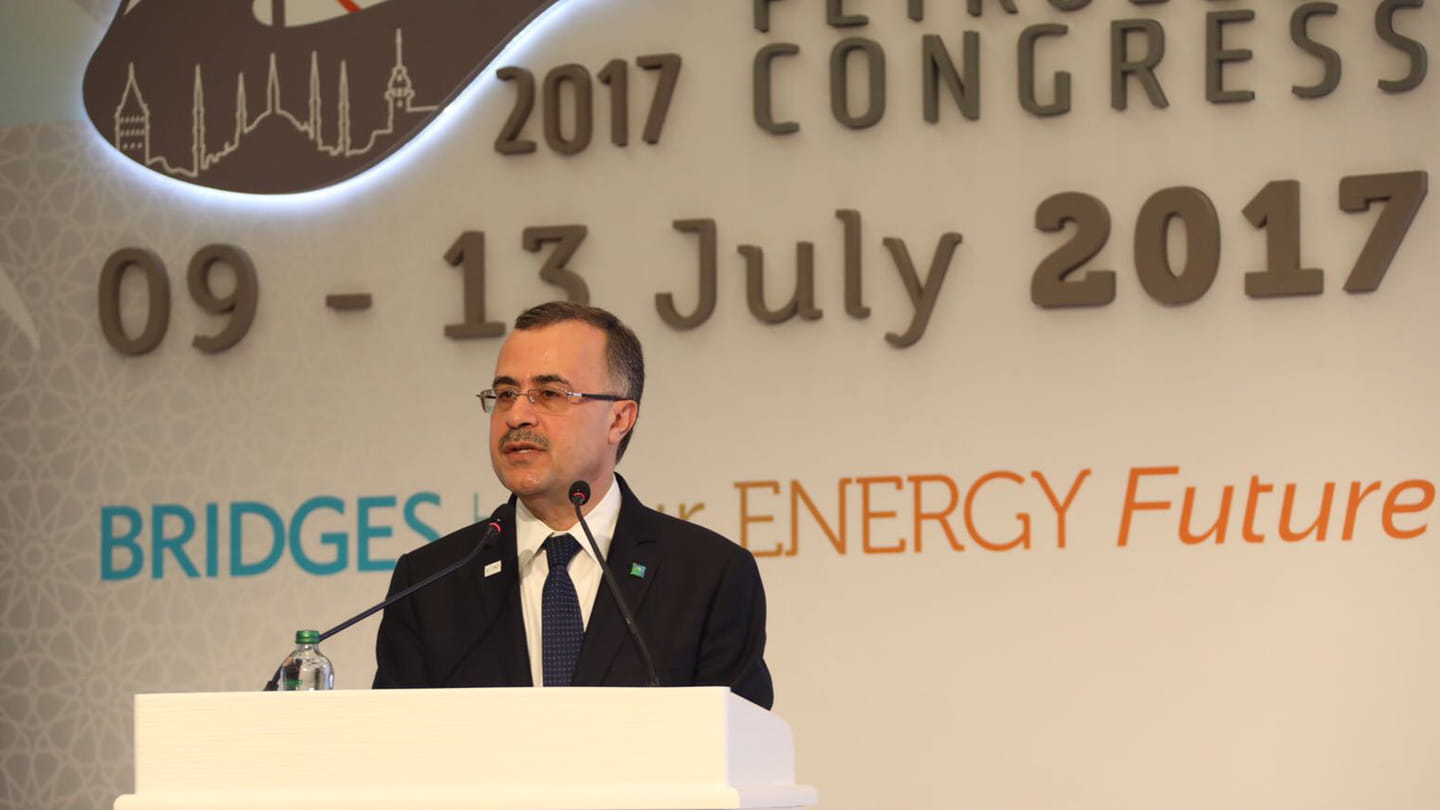Oil will continue to play a key role in global energy mix; continued investment in the sector is vital to ensuring global energy security

- The world can’t prematurely disengage from proven and reliable energy sources like oil and gas
- Falling investments in oil with $1 trillion already wiped out, is cause for concern to global energy security
- Saudi Aramco produced a record 10.5 million bpd in 2016 and plans to invest $300 billion over the coming decade
- Deployment of alternative energies is complex and will take time as part of the world’s long term energy transition
The role of oil as a vital source of energy to the world is expected to continue for the long term despite the growth of alternatives, said Amin H. Nasser, President and CEO of Saudi Aramco.
At the World Petroleum Congress in Istanbul today, Nasser reiterated in a keynote to heads of state, government ministers, and executives that new investments are necessary and crucial to ensuring global energy security. Nasser offered insights on the future of energy and how Saudi Aramco is transforming to meet new economic realities and industry demands.
Noting historic trends which saw a rise in absolute demand for legacy fuels despite a drop in market share, Nasser predicted in the next 25 years a doubling of the world economy, plus an additional two billion energy consumers, resulting in a lengthy energy transition that alternative sources such as renewables cannot adequately support.
“There’s a growing belief that the world can prematurely disengage from proven, reliable energy sources like oil and gas, on the assumption that alternatives will rapidly deploy,” Nasser said. “About $1 trillion in investments has been lost in the current downturn, concurrent to growing oil demand and the natural decline of developed fields. Conservative estimates suggest we need about 20 million [additional] barrels per day over the next five years to counter these effects.”
The volume of conventional oil discovered around the world halved over the past four years, compared to the previous four, according to Nasser, leading to an investment shortfall and the start of a cycle that may inhibit a future energy transition.
Nasser identified three areas that can build resilience and discipline for the transition: available supplies; cost structure and portfolio integration; and emissions reduction.
Addressing supplies, Nasser noted, “Saudi Aramco plans to invest more than $300 billion over the coming decade to reinforce our preeminent position in oil, maintain our spare oil production capacity and pursue a large exploration and production program centered on conventional and unconventional gas resources.”
Portfolio integration is also important, as Saudi Aramco emerges as the world’s largest and most integrated energy producer. The company has identified refining and chemicals, among other areas, as key drivers of long-term value and growth.
Leveraging innovation and technology to make the use of oil and gas ultra-clean relates to Saudi Aramco’s commitment to the Paris Climate Agreement. “We aim to double our natural gas production to 23 billion standard cubic feet per day (scf/d) over the coming decade, and raise the share of gas in the Kingdom’s utilities to about 70 percent, the highest of any G20 nation,” Nasser said. “We have collaborated with many oil and gas companies to promote low-emission solutions, to include our commitment to the Oil and Gas Climate Initiative’s $1 billion investment fund to develop and rapidly deploy those technologies.”
Nasser also noted that Saudi Aramco is prioritizing the direct conversion of oil to petrochemicals as a major part of its long-term strategic focus. The company is also investing in solar energy, having launched a phased program to build an initial renewable capacity of 9.5 GW by 2023.
Nasser concluded that while the industry can take pride in a history of significant economic contributions, it must adopt a future strategy calculated for the energy transformation. “Industry leaders and policy makers must develop an aligned and compelling narrative to attract the level of investments we need,” he said. “Part of that effort will be transforming our own business model to ensure that oil and gas are not just proven, reliable energy sources, but are as clean and affordable as possible, without compromising the world’s energy security,” he said.
Media contact information
All media enquiries are handled by Aramco's Media & Executive Communications Department, Dhahran, Saudi Arabia.
For media inquiries, please email us at media.inquiries@aramco.com

